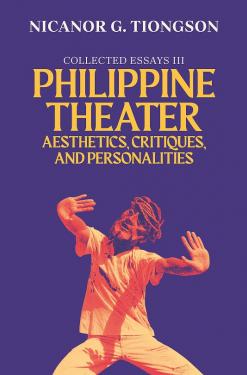
Volume 3: Philippine Theater Aesthetics, Critiques, and Personalities
Philippine Theater Aesthetics, Critiques, and Personalities, the third volume in Nicanor Tiongson’s trilogy of collected theater essays, is comprised of three parts. The first, “Criteria and Considerations in the Evaluation of Philippine Theater,” consists of an essay that proposes four approaches in the analysis of theater performances, the last of which is the use of “kamalayang Pilipino na maka-TAO” as the most important criterion for evaluation; a critique of the sarsuwela Walang Sugat by Severino Reyes, using the four approaches presented in the first essay; and an initial study which tries to define what might be called the “dating” or aesthetics of Philippine theater. The second part, “Reviews of Philippine Theater Performances and Books,” compiles selected reviews of a few books on Philippine theater and many performances of plays staged mostly in the 1970s by the Philippine Educational Theater Association (PETA), Babaylan, UP Repertory Company, and others, using the RPN criteria. The third part, “Artists and Groups in Philippine Theater,” anthologizes articles on the life and works of theater enthusiast Juan Atayde, writer-producer-actors Aurelio Tolentino and Atang de la Rama, bodabil singer and actress Katy de la Cruz, and theater designer Salvador F. Bernal, as well as essays on theater groups of the 1970s and 1980s and their productions, like the PETA, Babaylan, UP Repertory Company, Repertory Philippines, Teatro Pilipino, and Bulwagang Gantimpala.
“Like Tiongson’s book on the sinakulo in 1975, most essays in this volume use the Filipino language for writing literary history and criticism, analyze the plays not only as dramatic text but especially as mise-en-scene on an actual stage, and, most of all, recognize the importance of traditional plays as part of the national theater. In this period, no other scholar or theater artist or art administrator had the solid and unshakeable faith in Philippine traditional theater forms that Tiongson had . . . Most important, the essays in this trilogy illustrate the primacy of research as the scholar’s contribution and participation in laying the foundation for the full development of our national culture and, with it, the full flowering of our people’s humanity.”
— APOLONIO B. CHUA
Professor Emeritus, College of Arts and Letters
University of the Philippines Diliman
Published in 2024.




